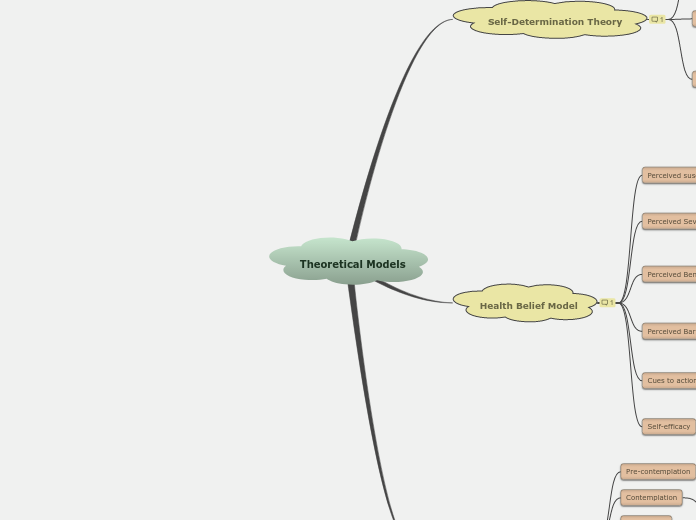Theoretical Models
Self-Determination Theory
Competence
The desire to feel effective in attaining valued outcomes
A mastery of things important to you
Essential to wellness
Autonomy
The desire to self-initiate and self-regulate own behavior
Self-endorsed
Congruent within yourself
Relatedness
A sense of belonging
The desire to care for and feel connected to others
I matter to others
Health Belief Model
Perceived susceptibility
Ones belief of the chances of getting a condition
ex: I am susceptible to the disease
Perceived Severity
Ones belief of how serious a condition and its consequences are
ex: I believe that the disease is serious
Perceived Benefits
Ones belief in the efficacy of the advised action to reduce risk or seriousness of impact
ex: I believe that the benefit of the recommended treatment will outweigh the costs
Perceived Barriers
Ones belief regarding the effectiveness of various actions available to reduce disease threat
ex: barriers to medication adherence including cost, side effects, etc.
Cues to action
Stimuli to trigger the decision making process
ex: prompt to remind about taking medication on time
Self-efficacy
Confidence in ones ability to perform an action
ex:I am confident that I can carryout the recommended treatment successfully
Transtheoritical Model
Pre-contemplation
Stage where people are not considering a health behavior change in the near future
Contemplation
Stage where people are intending to change in the next 6 months and need to be motivated to do so
Preparation
Stage where people intend to take action in the immediate future and need the skills to do so
Action
Stage where people are making a specific behavior change and can be supported by intervention strategies and guidelines
Maintenance
Stage where new behavior becomes habitual and requires less ongoing effort, but where relapse prevention is still important
Termination
Stage that occures when a new behavior is permanentaly ingrained
